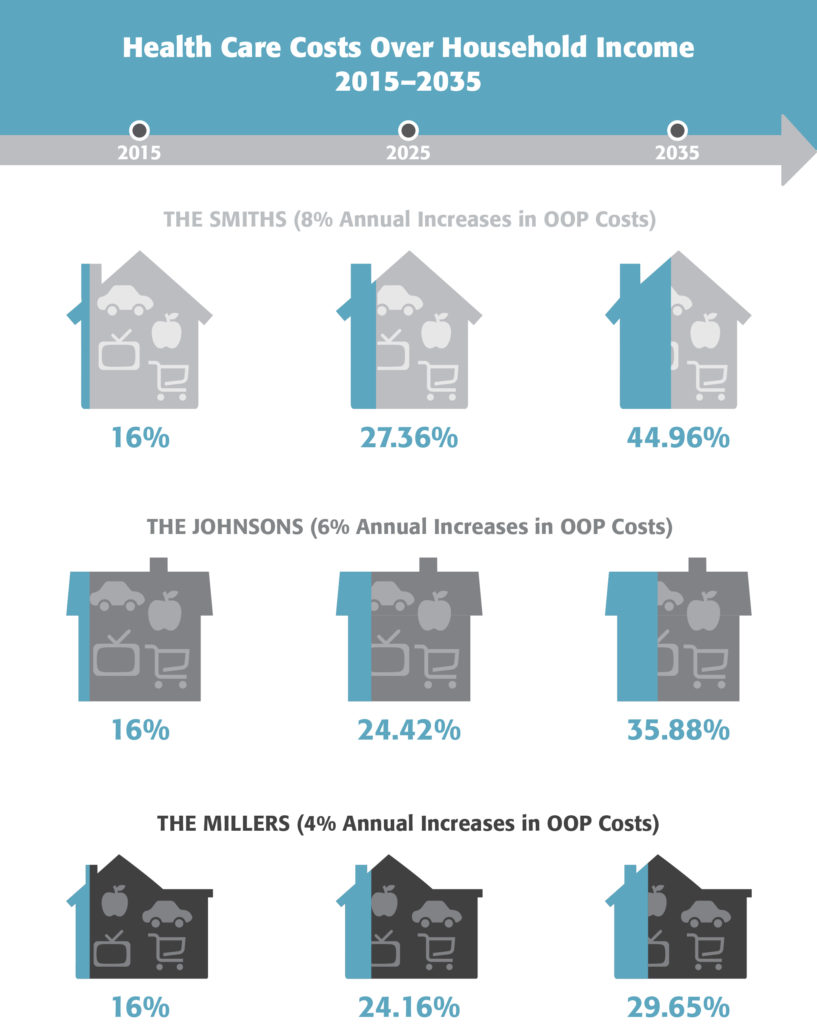Study: Health Care Costs on Course to Threaten Livelihood of Most American Families
Read news coverage of this report in the Springfield Republican.
Percentage of household expenses dedicated to health care on track to double over two decades
BOSTON – Health care costs are projected to continue to rise much faster than either inflation or household income, and a new Pioneer Institute study finds that if the trend continues unchecked, it will threaten the livelihood of most American families.
“As the cost of employer-sponsored health insurance continues to rise much faster than incomes, so do employee contributions to those plans,” said Pioneer Institute Executive Director Jim Stergios.
“What Will U.S. Households Pay for Health Care in the Future?” author Matthew Blackbourn shows that health care costs for a U.S. family of average income (including family insurance premium contributions and out-of-pocket costs including co-payments, co-insurance and deductibles) could increase from $8,583 annually to $13,213 by 2025, with some projections as high as $18,251. In terms of proportion of earnings, these projections would be equivalent to 20 percent and 27 percent of household income by 2025, respectively.
The report projects out to 2035, at which point health care costs for a U.S. family of average income could increase to $19,559 per year by 2035, according to the most optimistic scenario, and up to as high as $36,562 in the same year, according to the least optimistic scenario. In terms of proportion of earnings, this would be equivalent to 24.05 percent and 44.96 percent of household income by 2035.
To project the future impact of current trends, Blackbourn looked at three hypothetical families he placed on different points on the spectrum of projected increases in the cost of employer-sponsored health insurance policies. The projections are based upon annual increases in family premium contributions of 4, 6, and 8 percent and annual increases in out-of-pocket costs ranging from 4 to 6 percent.
The projections also optimistically assume 2 percent annual earnings growth, based on recent data for U.S. median household income. Actual annual earnings rose by 1.88 percent between 2001 and 2014, and by just 1.53 percent between 2009 and 2014.
Health care expenses currently consume 16 percent of median U.S. household income for families paying into employer-offered plans, according to data Pioneer used in its projections. From 2006 to 2014, the average annual deductible more than doubled. Between premiums and point-of-care expenses, average family health care costs went up by $100 per month between 2011 and 2014.
The report also discusses these trends in light of the growing popularity of consumer-driven care, which is one promising response to rising costs which incentivizes consumers to make more cost-conscious health care decisions. As the report notes, for consumer-driven health plans (CDHPs) to work, consumers must have easy access to price and quality data. Two Pioneer Institute studies have shown that price data often is not easily available, despite a 2012 state law mandating that providers disclose the prices of medical services and procedures to consumers.
Blackbourn offers several recommendations based on the findings of the report. The main recommendation calls for statutory changes to expand the role of health care-focused agencies like CHIA to more aggressively monitor cost sharing trends and how they impact family health care costs. The report also recommends measures to improve health care pricing transparency and establish a regulatory framework that is more patient-oriented through reform of Determination of Need (DON) policies and other restrictions on alternative delivery options that could benefit consumers.
Matthew Blackbourn is Pioneer’s research & operations associate. He has led projects for the Institute’s Center for Better Government, Center for Economic Opportunity and Health Care Initiative, and assists with managing the organization’s crowdsourcing initiative, the Better Government Competition. He holds a Bachelor of Arts in Political Science and Philosophy from Tulane University, where he was elected to Phi Beta Kappa and graduated summa cum laude.
Pioneer Institute is an independent, non-partisan, privately funded research organization that seeks to improve the quality of life in Massachusetts through civic discourse and intellectually rigorous, data-driven public policy solutions based on free market principles, individual liberty and responsibility, and the ideal of effective, limited and accountable government.




